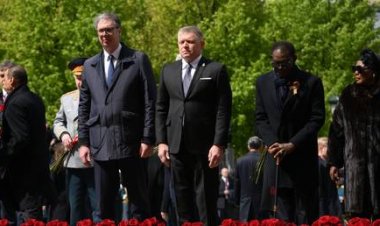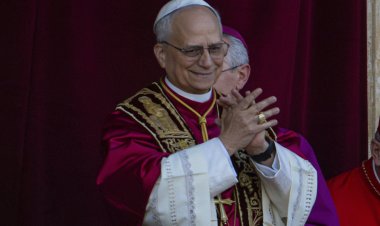David Hogg Triggered a ‘Circular Firing Squad’ Within the DNC
He’s informing Democrats that he’s willing to step down from his DNC position if it becomes necessary.

Among those present was David Hogg, an official who did not endorse the DNC's pledge. He expressed to a DNC staff member his reservations because his organization, Leaders We Deserve, engages in open primaries, as shared by a fourth person familiar with the discussion.
Just three weeks later, Hogg informed his fellow DNC officers that his organization intends to allocate funds to primary challenges against Democrats he termed “asleep-at-the-wheel” in safe-blue districts. His announcement on Tuesday, which included a commitment of $20 million for these efforts, sparked significant backlash from various Democrats, including Congressional members, fellow DNC members, and political strategists, many of whom showed concern regarding Hogg's dual roles as both an activist and a party official. Some voiced their frustrations on social media, while others reached out directly to Hogg for clarification.
The decision by a DNC official to financially support challenges against fellow Democrats has intensified existing tensions within the party, especially during the ongoing Trump administration. “We, as the DNC, need to be seen as a body that can be trusted, that’s not putting its thumb on the scales,” one anonymous DNC member stated. “We have to be so strategic and careful with our resources right now. … So why are we in this circular firing squad against Democrats?”
Likewise, an anonymous Democratic House member remarked that “having someone who serves in an official capacity leading the effort is challenging when at this moment we need to be bringing the party together,” arguing that Hogg was bypassing private discussions that Democratic leaders typically have about their members’ futures.
Despite the pushback, Hogg has indicated he is determined to proceed with his plans. He recently communicated to party members that he is prepared to relinquish his vice chair position as a result of this campaign. While he has not revealed specific members he intends to target, he clarified that his group would not challenge former House Speaker Nancy Pelosi or Rep. Jan Schakowsky, both of whom have attracted younger primary challengers. Democrats aim to reclaim a few seats from Republicans to regain a majority in the House, which they see as essential for providing a check on Trump's presidency.
“I'm going to fight to remain in this position because I believe I can serve the party. This was my job when I was elected, this was my job as I was running [for vice chair], and I'm willing to fight to say why I believe both are possible at the same time,” Hogg asserted. “I'm not using the DNC’s resources in these races. I'm not going to get involved in the presidential primary and I’m abiding by what the current bylaws are.”
Nonetheless, many Democrats worry that Hogg's focus on internal conflicts will detract from their mission to oust Republicans in battleground districts. “Democrats are united in taking back the majority in the House and that's the top focus of the DCCC,” stated Rep. Suzan DelBene, chair of the Democratic Congressional Campaign Committee. “What I would tell anyone who wants to be helpful or to donate is to focus on those races where we can take back the majority. We just released our map of Districts in Play, the races where we have opportunities to win all across the country. This is how we win and make sure there is a check on this administration.”
Hogg's election to the DNC in February occurred during a time when the party was reckoning with its direction after significant losses in November. Concerns were already raised by some centrist Democrats regarding his history of far-left rhetoric. Now, his move to challenge members of his own party has provoked outrage from various quarters.
Jay Jacobs, chair of the New York Democratic Party, remarked that while he believed Hogg's elevation to vice chair was beneficial, unity is now crucial. “Engaging in an aggressive, internal type of purging of incumbents that you disagree with is counterproductive to the mission of the DNC,” he said.
Some party members fear that Hogg's actions as a DNC official could undermine the committee's standing as a neutral broker, even if he acts outside his vice chair role. Others emphasized that prolonged primary campaigns could steer the party further leftward and complicate its efforts to find a way forward after recent electoral challenges.
"It's another distraction from what we really need to be doing, which is we need to be laying out a platform,” one Democratic member noted, speaking anonymously. “The American people want us to address the concerns they have in their lives. Fighting amongst ourselves is not the answer.”
"I'm all for getting rid of a bunch of old ineffective people,” the member added, “but not by running a bunch of lefty campaigns against them."
Conversely, some Democrats view Hogg’s initiatives as a necessary shake-up for the party. Randi Weingarten, president of the American Federation of Teachers, commented on social media, suggesting that changes in messaging are required and highlighting Hogg’s attempt to facilitate that change.
“If a few Democratic primaries elect some good candidates in places where the Democratic voters have said, ‘we want a different option,’ what’s wrong with that? I don’t see a problem with that,” said Colin Rogero, a Democratic strategist. “If you’re doing a great job as a member and you have a primary challenger, you should be able to beat them.”
Tomika Vukovic, a Wisconsin DNC member, agreed, asserting that “everyone knew what his day job was and we knew what his organization does” when he campaigned for vice chair, suggesting it was unreasonable to ask him to stop functioning in that role now.
The issue of primaries has become a particularly contentious subject among House Democrats in light of recent experiences, especially following primary losses for progressive members of the Squad last year, which were backed by the American Israel Public Affairs Committee’s super PAC. Many liberals expressed frustration that party leadership had not done enough to protect their incumbents, while moderates remain uneasy about potential primary challenges from the left amid ongoing debates about the party's strategies in the Trump era.
Some had assumed that the enthusiasm for primaries had diminished since the party's losses last fall, especially after Rep. Alexandria Ocasio-Cortez indicated she would no longer support challenges against incumbents.
The DNC's top leadership is reported to be “upset and frustrated” by Hogg's decision, viewing it as a significant distraction from their primary goal of winning back the House. A senior Democratic leadership aide, speaking anonymously, underscored the importance of staying focused on the broader objective rather than allowing internal strife to capture media and donor attention.
“You can either work within the party and try to make it better or you work on the outside and you get to be more aggressive about it,” the aide said. “I don’t see how he plans to reconcile those roles.”
House Minority Leader Hakeem Jeffries has maintained his support for incumbents, co-founding the “Team Blue PAC” to protect them. His stance remains unchanged.
“Leader Jeffries will continue to strongly support all of his colleagues in the House Democratic Caucus, while working to flip the majority by defeating Republican incumbents in Congress,” stated Jeffries spokesperson Justin Chermol.
Hogg contended that promoting primary challengers aligns with his campaign platform, emphasizing the necessity to demonstrate to the party base that they are committed to fighting for them and showcasing younger leadership.
Tensions within the DNC regarding these internal divisions are not new. For instance, then-Rep. Tulsi Gabbard resigned as DNC vice chair in February 2016 to endorse Sen. Bernie Sanders for president, alleging favoritism towards Hillary Clinton from then-DNC chair Rep. Debbie Wasserman-Schultz.
"It took years to rebuild the DNC’s credibility in the aftermath of 2016, so to have a party officer disregard the importance of being able to call balls and strikes is deeply disappointing,” remarked Sam Cornale, who served as the DNC’s chief executive last cycle. “An officer of the Democratic Party should not be putting their fingers on the scales in primaries.”
Donna Brazile, who once served as the interim chair of the DNC, mentioned that she recently had a positive conversation with Hogg, indicating that he is still developing his strategy.
“Over the decades, I’ve always been available to help a new generation of leaders find their seats at the table, but I’ve tried to do it in a way where we bring in more chairs,” Brazile stated. “I told him he’s throwing a rock in the water.”
James del Carmen for TROIB News












